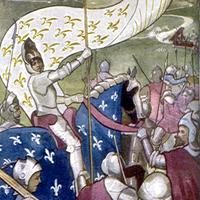48. Siege and Fall of Mexico
"So shall inferior eyes, That borrow their behaviour from the great, Grow great by your example, and put on The dauntless spirit of resolution. " —SHAKSPERE. Not for one moment, however, did the brave Cortes flinch in his purpose of taking Mexico. The "melancholy night," as it has since been called in history, had wrought sad havoc with his troops; but such was the determination of the man that, ten months later, he was ready to besiege the city of Mexico. It was April 28, 1521, the day after Magellan had died in the Philippine Islands, though Cortes knew it not, for news travelled very slowly in those days.
The story of the siege of Mexico is one of the most striking in the world's history. The dauntless heroism of the Mexicans in their wonderful defence was equalled only by the determination of the Spaniards to suffer no defeat at their hands.
With extra supplies of men and ships from Spain, Cortes marched to the great city on the waters. Before long, on the great lake surrounding the city, sailed the Spanish ships, with music sounding and the royal flag of Spain proudly floating in the air. The ships, like snowy sea-birds, bounded over the waters, until a shout of admiration broke from the Mexicans. Then guns roared from the shore, and the stern Spaniards felt that success was at last going to crown their efforts.
Once more Cortes roused them to enthusiasm.
"I have taken the last step," he cried; "I have brought you to the goal for which you have so long panted, the capital from which you were driven with so much disgrace. We are fighting the battles of the Faith—fighting for our honour, for riches, for revenge. I have brought you face to face with your foe: it is for you to do the rest. " A thundering chorus of voices declared that every man would do his duty under such a leader as Ferdinand Cortes.
So by water and land they attacked the beautiful city and assaulted the brave defenders. It was a time of unceasing toil, almost beyond the strength of the stubborn Spaniards. Through long, wet, cold nights, and scorched by the tropical sun by day, they had to stand at their posts. Their sufferings were great indeed, but their firm resolve to take the city was greater.
Meanwhile famine was striding through the heart of Mexico. The stores of the Mexicans were exhausted. They had eaten all the Spaniards they could take, as well as rats, lizards, and other reptiles; but their hatred of the enemy was undying, and, animated by despair, they fought on. Cortes sent message after message to urge surrender. The game was up, the fair city was crumbling into ruins.
"Spain shall take your city under her protection," ended the proposal. The eye of the young king—Montezuma's nephew—kindled. His dark cheek flushed with sudden anger as he listened to such a message. He called his wise men together.
"Peace is good," they said, "but not with these white men. Better, if need be, give up our lives at once for our country than drag on in slavery and suffering among strangers. " "Then," cried the young king, "let no man henceforth talk of surrender. We can at least die like warriors. " But their strength was not equal to their spirit. Their very streets were full of dead and dying men.
"A man could not set his foot down," said Cortes afterwards, "except on the corpse of an Indian. " Death was everywhere. Calm and courageous in the midst of dead and dying, his fair capital in ruins before his very eyes, the young king stood firm. In vain Cortes sought an interview to persuade him that his noblest path was now to surrender. Messengers came and went, but the young king refused to see Cortes.
"Go, then," cried Cortes at last, impatiently, "and prepare your countrymen for death: their hour is come. " So the ruler of Mexico was captured.
"Better despatch me with this and rid me of life at once," he cried desperately, drawing his sword as Cortes came forward to receive him with studied courtesy. The proud bearing of the young Mexican was worthy the spirit of an ancient Roman.
"Fear not," replied Cortes, "you shall be treated with all honour. You have defended your capital like a brave warrior: a Spaniard knows how to respect valour even in an enemy. " So the Spaniards conquered Mexico at last. Soon a new city rose on the ruins of the last, still more beautiful and still more important, until the old writers cried in their ecstasy: "Europe cannot boast a single city as fair and rich as Mexico. "

